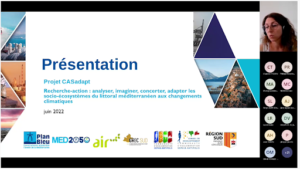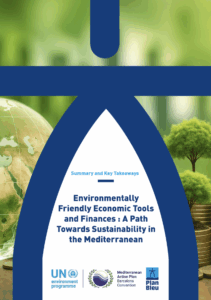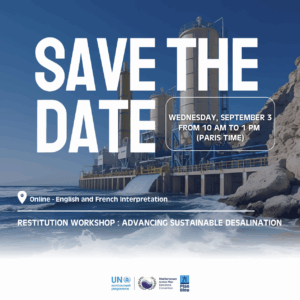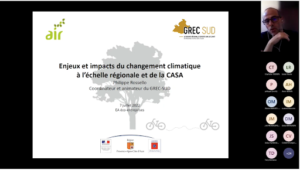On July 7th, the CASadapt project was presented during a webinar dedicated to the impacts of climate change at the scale of the Sophia Antipolis Agglomeration Community (CASA).
This webinar was organised by the Cluster Éa éco-entreprises – which supports regional eco-companies to encourage the emergence of innovative solutions and services – in collaboration with GREC-SUD – Regional Group of Experts on Climate in Provence-Alpes-Côte d’Azur.
It was an opportunity to take a look at the challenges of climate change and the associated risks in the CASA region and to highlight the interest of a project like CASadapt in order to collectively think about measures for adapting the socio-ecosystems of the Côte d’Azur coastline, and more broadly, the Mediterranean, to the fast-changing climate.
This seminar gathered more than thirty public and private actors who exchanged on the challenges and concrete solutions to be brought in order to engage on the path of the ecological and energy transition of the CASA. This meeting offered the socio-economic actors the opportunity to take part in a territorial dialogue under construction and to put forward ambitious projects:
- the development of an integrated coastal management strategy,
- the implementation of the CASA 2040 process for the elaboration of the Schéma de Cohérence Territoriale (SCoT) valid as the Plan Climat-Air-Energie Territorial (PCAET),
- pooling and disseminating data on coastal risks and adaptation to climate change in the Provence-Alpes-Côte d’Azur region – via the Mon Littoralplatform
- the creation of an observatory on climate change dedicated to the Maralpine territory and carried out by the Syndicat Mixte For Flooding, Water Development and Managementin the Maritimes or SMIAGE
This multi-voice dialogue also highlighted the urgent need to develop operational adaptation measures and to answer a series of questions:
- How can water resources management be adapted to cope with the current and future droughts?
- What could be the contribution of the industrial and agricultural sectors to these transformations?
- How can we think about the attractiveness of the territory if the water resources are degraded and the coastline is changing?
- How to produce indicators and data related to the costs and benefits of different climate change adaptation measures?
These are all questions that can be addressed during the various workshops of the CASadapt project in order to consider a resilient territory that is less vulnerable to the impacts of the climate changes that lie ahead.
The presentations and the replay are available online














